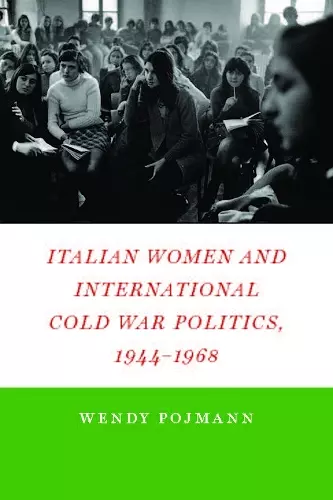Italian Women and International Cold War Politics, 1944-1968
Format:Hardback
Publisher:Fordham University Press
Published:11th Feb '13
Currently unavailable, and unfortunately no date known when it will be back

Develops a critical understanding of this important period in women's activism between the 1940s and 1970s
A groundbreaking account of the two largest autonomous women’s associations in Italy during the early Cold War—the UDI and the CIF—and how they developed an active Italian and global agenda for the advancement of women’s rights
The women of the Socialist/Communist Unione Donne Italiane (UDI) and the lay Catholic Centro Italiano Femminile (CIF) are the protagonists in this keen study of the relationship between national Italian women’s associations and international women’s movements from 1944, when the associations became active, to 1968, when another generation of activists led women’s movements in a new direction. By considering the reach and impact of these organizations in relation to Italian bipolarism (the nearly equal division of the Italian people into two camps, one pro-Communist and the other pro-Western) and world events, Dr. Wendy Pojmann demonstrates that women played a much larger role than Cold War histories tend to relate. Not just voters, women were active political participants during the tumultuous decades of the Cold War. Italian Women in International Cold War Politics, 1944–1968 pays particular attention to the UDI’s work with the largest
international postwar women’s organization, the pro-Soviet Women’s International Democratic Federation (WIDF), and the CIF’s relationship with the global Catholic organization the World Movement of Mothers (WMM), to better understand the ways in which the Cold War affected both national and international agendas for women’s rights.
The Italian case is particularly significant in placing women’s movements in a broader context because it exemplifies many of the political and ideological dichotomies that characterized this period. With the Christian Democrats at the helm of the Italian government and the powerful opposition of the Communists, the Italian women’s associations developed and used creative negotiation strategies to advance their visions of womanhood in a new era. They applied similar practices in their international work.
This engaging, well-documented book draws on new and original material from archival collections and oral histories to develop a critical understanding of the important but often overlooked period in women’s activism between the 1940s and 1970s.
"Italian Women and International Cold War Politics, 1944-1968 identifies a real gap in scholarship on international women's movements on the period between World War Two and the Second Wave feminist movement of the 1970s This book address that gap offering an engaging and well documented account of two Italian women's associations, the UDI and the CIF. Pojmann offers both new and original material, and develops critical understanding of an important and generally overlooked stage in women's organizations." -- -Helen LaVille University of Birmingham "The history of two important Italian women's organizations, the Unione Donne Italiane (UDI) and the Catholic Centro Italiano Femminile (CIF), set in the context of the Cold War era, 1945-68, is a valuable contribution to the scholarship of women's organizations and national and international politics. " -- -Karen Garner SUNY Empire State College "Pojmann's work is an excellent addition to literature on women's movements, postwar Italy, and the complexity of Cold War politics." -H-Net Reviews "The book should find an audience among scholars who will value access to new Italian evidence, as well as in undergraduate classrooms, where students of women's history and students of contemporary European history will both have a reading either of the whole book or of specific sections to provide strong coverage of the Cold War years in their syllabi. The real value here is, as I stated at the beginning of this review, that English-language readers are now being enabled to join the conversation about gendering the Cold War and about the significance of Italy as a laboratory of politics; and Pojmann's book makes a very useful contribution to that project." -H-Diplo
- Commended for Choice: Outstanding Academic Title 2014
ISBN: 9780823245604
Dimensions: unknown
Weight: unknown
248 pages